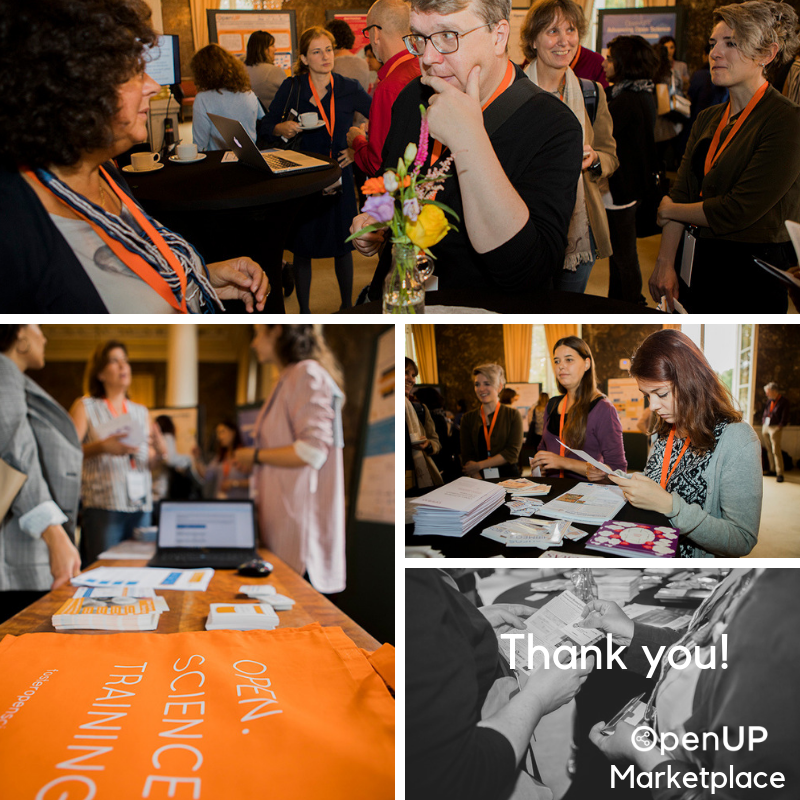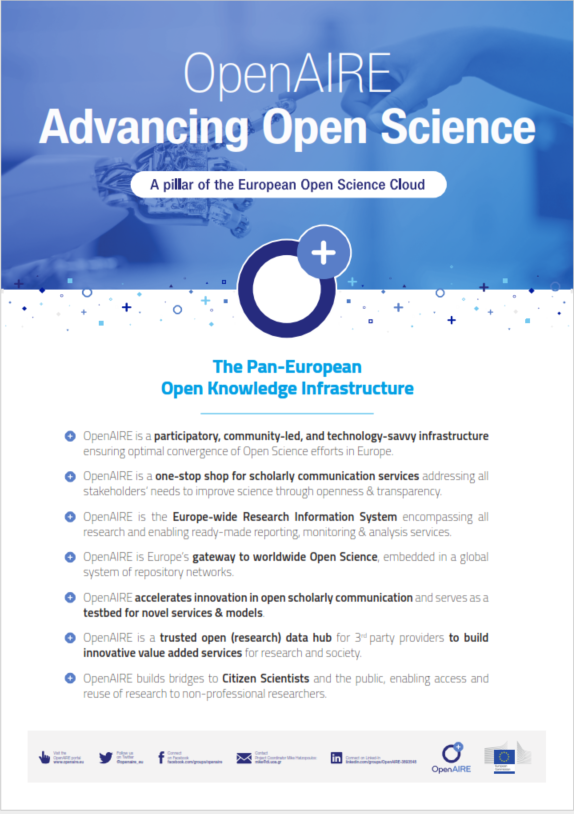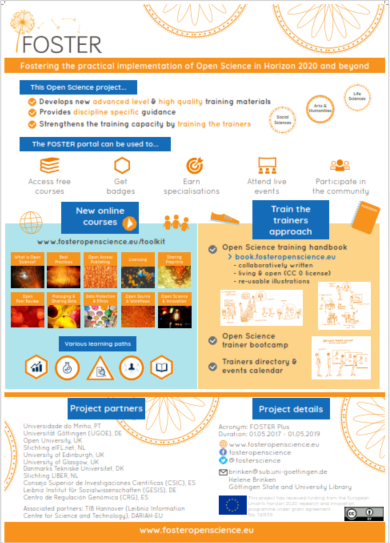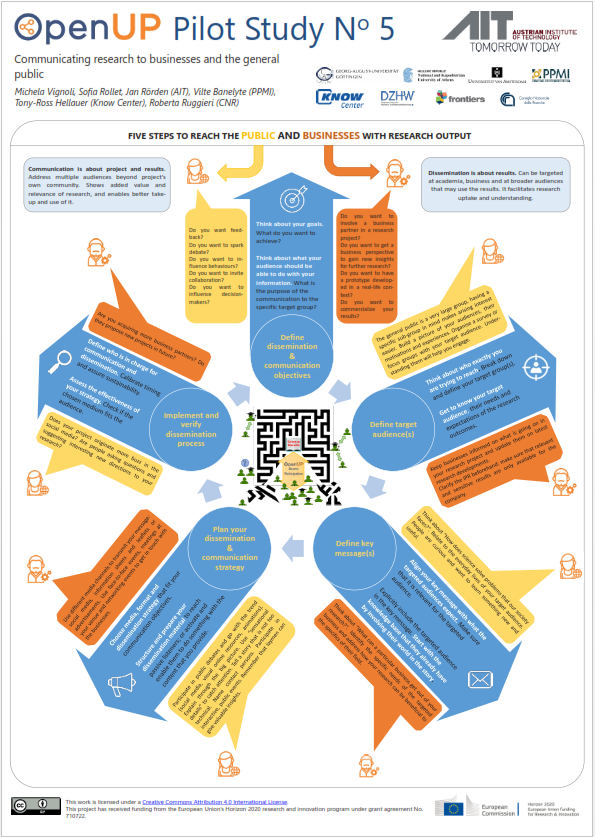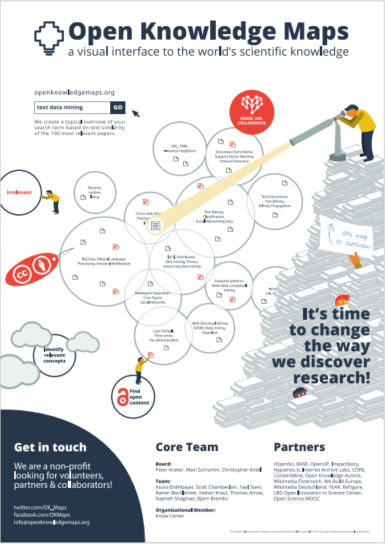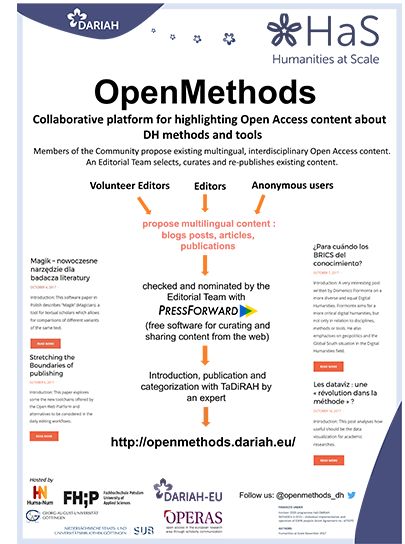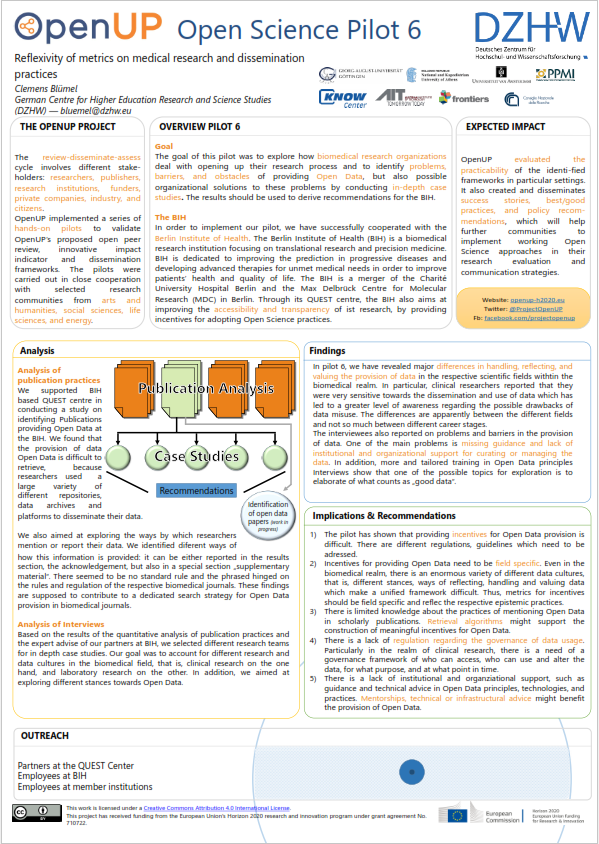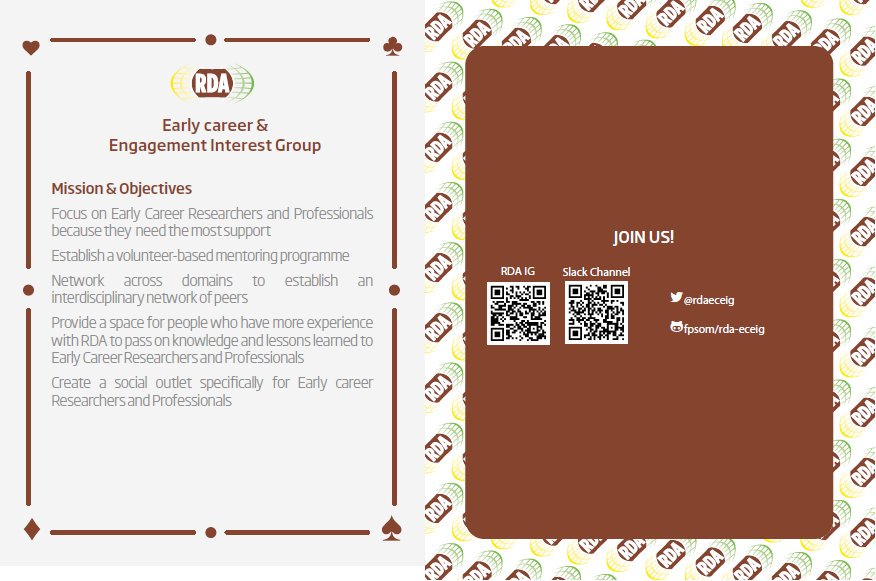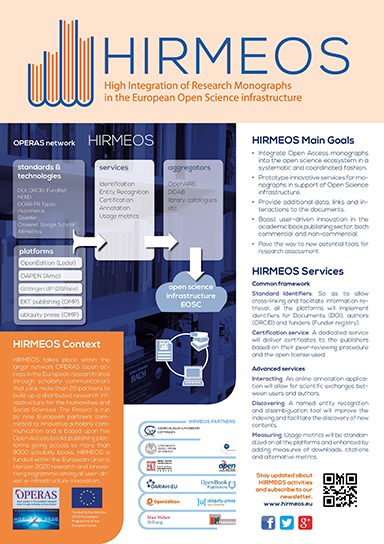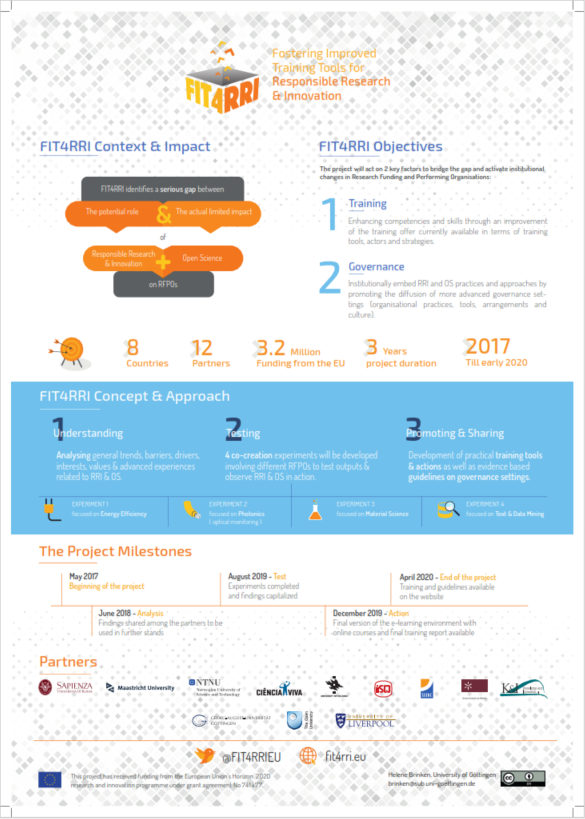Motivate and Meet: the New Methods Marketplace
Open Access and Open Scholarship have revolutionized the way scholarly artefacts are evaluated and published, while the introduction of new technologies and media in scientific workflows has changed the “how and to whom” science is communicated, and how stakeholders interact with the scientific community. At the OpenUP Final Conference (5-6 September 2018) state-of-the-art ideas and services for opening up the review-disseminate-assess phases of the research lifecycle were showcased, recent hot topics were covered (e.g. Plan S and its 10 principles), and different Motivate and Meet sessions, including a Marketplace for innovative tools, methods and ideas, fostered interaction and exchange in the context of Open Science. The Marketplace setting hosted key players of the Open Science scenery. Let's meet them!
OpenAIRE
OpenAIRE is a European project supporting Open Science. On the one hand OpenAIRE is an network of dedicated Open Science experts promoting and providing training on Open Science. On the other hand OpenAIRE is a technical infrastructure harvesting research output from connected data providers. OpenAIRE aims to establish an open and sustainable scholarly communication infrastructure responsible for the overall management, analysis, manipulation, provision, monitoring and cross-linking of all research outcomes.
| During the Marketplace, delegates were informed about how OpenAIRE fosters Open Science in Europe, among others, through its repositories network stressing the value added to the research processes and outputs through OpenAIRE activities such as interlinking and contextualisation of research information. With its pool of services and tools and with assistance of dedicated experts, the so-called National Open Access Desks or NOADs, OpenAIRE supports all kind of stakeholders, from researchers to SMEs and citizens, in their “open” activities and endeavours. Hence, it is considered to be a pillar of the European Open Science Cloud (EOSC) for Open Science and Open Scholarship matters. | ||
|
Image 1: OpenAIRE poster - OpenAIRE advancing Open Science |
||
OpenUP pilots in Peer Review
Three OpenUP pilot studies were presented at this booth. Pilot 1: Open Peer Review for Conferences presented a demo of the adapted HotCRP software, which integrated Open Peer Review (OPR) options into the conference management system. The tool was applied and tested in two conference venues: the Second European Machine Vision Forum 2017 (EMVA 2017) and the second venue was the eHealth2018 Master Student Competition. The conference organisers agreed to test the four OPR principles “Open Identity”, “Open Participation”, “Open Report” and “Open final-version comments” for papers submitted through the submission system, and the software was adapted accordingly. The resulting source code has been released to the public under an open source license at the HotCRP GitHub repository linked above.
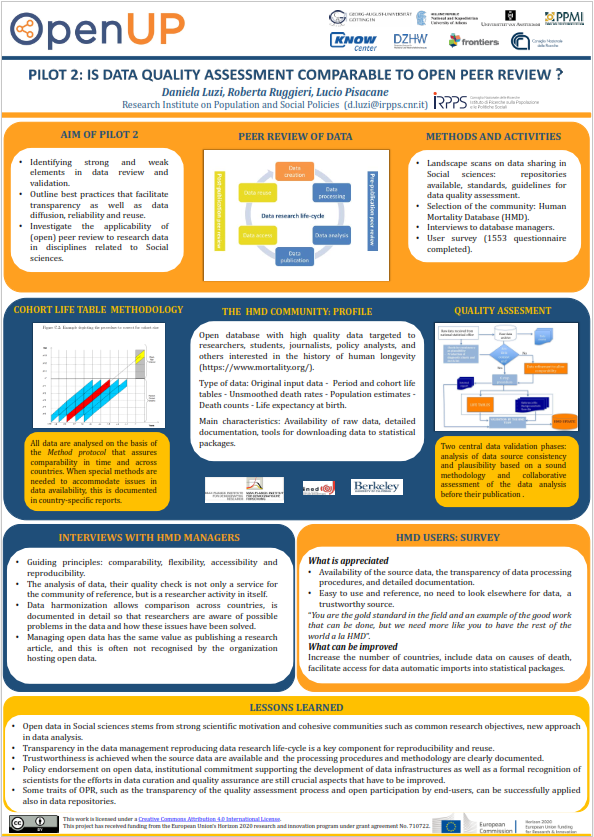 |
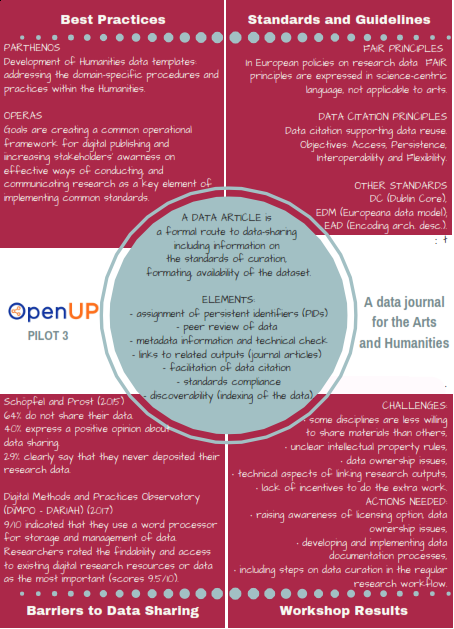 |
Image 2: Poster of pilot 2 - Open Peer Review for Research Data (left) Poster of pilot 3 - A data journal for the Arts and Humanities (right)
Two posters were displayed as well. OpenUP’s Pilot 2: Open Peer Review for Research Data was devoted to analysing OPR for research data in the scientific community of the Human Mortality Database (HMD). OpenUP interviewed HMD managers and country specialists and did a survey with HMD users. The interviews gave valuable insight into origin, motivations and organisational features of HMD, the goal and main features of the database, its data quality assessment process, and the interviewees’ pinion on Open Access to data. The survey specifically focused on the HMD user’s practices and attitudes in data access and use.
Pilot 3: A data journal for the Arts and Humanities analysed and demonstrated the feasibility of a basic workflow that will combine the publication of data with commenting and reviewing systems. The pilot had a dual purpose: on the one hand, it described the data sharing practices within Humanities research. On the other hand, the study evaluated how quality assessment and (open) peer review can be applied to research data within this field of study.
FOSTER
| The EU-funded project FOSTER Plus (2017-19) aims at fostering a cultural change towards Open Science. In order to support the practical implementation of Open Science, the project provides various training opportunities for researchers with a strong emphasis on e-learning. The interactive training courses cover key Open Science topics and focus on the burning questions academics may have about practicing open Science. The courses include discipline-specific examples and tools, where relevant, to meet different needs of the scientific communities. In addition, FOSTER follows a train-the-trainer approach building support structures and materials, such as the Open Science Training Handbook, to bring together and support the Open Science trainer community. | ||
| Image 3: Foster poster - Fostering the practical implementation of Open Science in Horizon 2020 and beyond https://doi.org/10.5281/zenodo.1412660 | ||
OpenUP Pilots in Innovative Dissemination
Two OpenUP pilots were presented. Pilot 4: Transferring the research lifecycle to the web interactively demonstrated and tested the OpenOnlineResearch (OOR) tool that was developed further in OpenUP. We invited conference participants to use the interpretation features of OOR, visually observe the use of it, and asked them about usability, instructions and meaning of the interpretations given. Six participants have gone through the software and performed the main operations. It turned out that users understand the flow and meaning of the software swiftly and are able to produce meaningful content. It also turned out that we omitted a small number of instructions. The test also triggered participants to think about the applicability of the tool. For example: one participant suggested to try the tool for peer-review.
|
|
A poster of Pilot 5: Reaching businesses and the public with research output was presented. Based on input gathered from seven interviewed science communication experts, OpenUP created guidelines and recommendations for researchers who want to communicate their research to target audiences beyond academia. The guidelines were tested by the European ReFlex project and were improved further according to their feedback. Based on the provided recommendations and guidelines, the research community re-shaped and evaluated their dissemination strategy and produced targeted dissemination content tailored to its stakeholders. |
|
| Image 5: Poster of OpenUP Pilot 5 - Reaching businesses and the public with research output | ||
Open Knowledge Maps
|
Open Knowledge Maps is a non-profit dedicated to revolutionizing discovery of scientific knowledge. We are developing a visual interface that dramatically increases the visibility of research findings for science and society alike. On our website, users can create knowledge maps of research topics in any discipline. These visual overviews show the main areas in a field and provide relevant papers and concepts. So far, more than half a million people have leveraged Open Knowledge Maps for their research, work and studies. |
||
| Image 5: Open Knowledge Maps: A Visual Interface to the World's Scientific Knowledge https://doi.org/10.5281/zenodo.1410307 | ||
OpenUP Hub
 |
OpenUP Hub is one of the most important outputs of the OpenUP project. OpenUP Hub is an open, dynamic and collaborative knowledge environment that systematically captures, organizes and categorizes research outcomes, best practices, tools, and guidelines relevant to review-dissemination-assessment phases of the research lifecycle through the prism of Open Science. |
|
|
It is an end-to-end tool from researchers to researchers that shifts from one-way to multi-way communication opening multiple channels and giving the opportunity to all users to interact with the hosted material and connect with other users. Interaction is encouraged and supported by several means, the three most indicative services of OpenUP Hub are the following: |
||
- Three toolboxes for open science solutions, trainings and services addressing specific needs & questions on alternative peer review, altmetrics and innovative dissemination methods.
- A Blog where articles and point of views on Open Science are collected, uploaded and promoted. Scientists, librarians, open science advocates and all community members are motivated to promote and advance their work, share innovative ideas, receive feedback from experts and interact with other community members.
- A Suggestion Box, where all users can suggest new tools, material, events, ideas.
DARIAH
|
|
The OpenMethods platform brings together all formats of Open Access publications in different languages about methods in Digital Humanities to spread the knowledge and raise peer recognition for them. The platform has been developed in close partnership with and supervision of the DARIAH community since it is an offspring of the DARIAH “Humanities at Scale” project. | |
|
Image 6: DARIAH “Humanities at Scale” poster- OpenMethids platform |
||
OpenUP Pilots in Impact Assessment
|
|
Two OpenUP pilots were dedicated to Impact Assessment topics. Pilot Study No 6: Reflexivity of metrics on medical research and dissemination practices explored how biomedical research communities deal with opening up their research enterprise and how reflexive engagement with research practices at their facilities might help to develop metrics and incentives for research organization. We analysed debates in editorials of major biomedical journals and interviewed researchers and managers at the Berlin Institute of Health (BIH). Based on this analysis and the discussion, we found that there may be different cultures of dealing with data in the biomedical sciences. |
|
|
Image 7: Poster of OpenUP pilot 6 - Reflexivity of metrics on medical research and dissemination practices |
||
Pilot 7: Piratical demand as a form of impact indicator and reaching unexpected audiences demoed the results of the quantitative, statistical and econometric analysis of large scale datasets on the supply of and demand for scholarly works on illegal platforms. The study is based on a number of data sources to analyse the supply and demand of pirated scholarly publications. The analysis of supply is based on the catalogue of Library Genesis. The shadow library publishes its catalogue with basic bibliographic metadata as daily database dumps. Usage data is based on to two sets of access log data provided to us by the administrators of one of the mirror services that distribute the titles in Library Genesis.
|
|
|
| Videos: OpenUP pilot No 7: Animations showing the use of one of the shadow libraries over the course of several months in Europe and USA | |
RDA Early Career and Engagement Interest Group
The purpose of the RDA Early Career and Engagement Interest Group (ECEIG) is to provide a focal point for Early and Mid-Career Researchers and Professionals, including those involved in various RDA-related fellowships and Early Career programs. RDA members recognize that there is a need to create a space in RDA for those who are at the beginning stages of their careers. Specifically, RDA members recognized that Early Career Researchers and Professionals usually need additional support for:
- networking amongst themselves to learn about other Early Career scientists and their research, i.e., establishing a “network of peers”, and
- mentoring from senior RDA members who are interested in mentoring Early Career Researchers and Professionals.
|
|
Specifically, objectives of this IG are to:
|
|
| Image 8: ECEIG cards | ||
HIRMEOS
Open Science means more than mere Open Access, and Open Access does not mean just journals.
Not enough has been done yet to integrate Open Access monographs into the open science ecosystem in a systematic and coordinated fashion. That’s the main goal of High Integration of Research Monographs in the European Open Science (HIRMEOS) project. The project addresses the particularities of academic monographs as a specific support for scientific communication in the Social Sciences and the Humanities and tackles the main obstacles of the full integration of monographs into the European Open Science Cloud. It aims at prototyping innovative services for monographs in support of Open Science infrastructure by providing additional data, links and interactions to the documents, at the same time paving the way to new potential tools for research assessment, which is still a major challenge in the Humanities and Social Sciences.
|
|
HIRMEOS will prototype and set up a common layer of added value services on top of existing e-publishing platforms for open access monographs by implementing common standards and crosslinking the documents with others and with various types of digital objects related to the research process. The project builds on two combined pillars: integration and innovation. HIRMEOS won’t develop new technologies from scratch but rather use already existing ones and prototype their implementation on the specific types of digital objects that are academic monographs. The technologies used will be the most innovative of the moment although mature enough to be implemented. HIRMEOS is also a sort of proof of concept of a broader project, OPERAS, whose aim is to certify, discover and activate research (https://operas.hypotheses.org/). |
|
| Image 9: HIRMEOS poster | ||
FIT4RRI
|
|
FIT4RRI is an EU-funded project (2017-20) that aims at bridging the gap between the potential and the actual role RRI and Open Science play in helping RFPOs to manage the rapid transformation processes affecting science. The project analyses general trends, barriers and drivers to RRI and Open Science to develop actions, strategies and improved training tools that activate institutional change and create an enabling environment for RRI and OS. Conducting four co-creation experiments in partner institutions, FIT4RRI observes RRI and OS in action to complement the theoretical analysis and test first results. |
|
| Image 10: FIT4RRI poster - Fostering improved training tools for responsible research and innovation https://doi.org/10.5281/zenodo.1413526 | ||
Presenters’ Views (Quotes)
Different Motivate and Meet initiatives like the Marketplace offer a great opportunity to interactively present research work directly to the community. What benefits do the presenters see in this setting? Let’s explore what do they think.
OpenAIRE & RDA ECEIG
"The Marketplace was the perfect opportunity for people to get a better understanding of represented projects activities and outcomes; for OpenAIRE, in particular, it provided insight to services and tools other than the validator for interoperability of repositories, with most popular being Amnesia for anonymisation of data and Research Community Dashboard for ease in communication, monitoring and reporting of research."
"Given the participation of early career researchers at the conference as winners of the OpenUP blog competition, this proved to be a great chance to open discussions about the mission of the ECEIG focusing mainly on the Mentoring Programme which has been established and the monthly calls organised with RDA ECEIG members and beyond."
Elli Papadopoulou
Foster & Fit4RRI
“The OpenUP marketplace was a great opportunity for FOSTER. Showing the new training materials directly to the community, allowed us to discuss, answer questions and listen to feedback.
[Fit4RRI] Being part of the OpenUP marketplace was a perfect opportunity to connect and exchange with the community and various stakeholders.”
Helene Brinken
Open Knowledge Maps
“The marketplace was very beneficial for us. It enabled us to engage with (potential) users and receive valuable feedback, but also to talk to potential new collaborators. We would certainly participate in such an event again.”
Peter Kraker
HIRMEOS
“As HIRMEOS aims at building services and addressing the community needs, the Marketplace was a perfect way to receive comments and useful feedbacks from researchers and publishers. The idea of the stalls is useful as it allows a lot more interaction than the traditional poster session. “
Elena Giglia
DARIAH
“It was our great pleasure to present OpenMethods on the colourful palette of the OpenUp Marketplace. Continuous cross-stakeholder exchange is inevitable for the development of great ideas, essential services and a better functioning scholarly communication ecosystem at large.”
Erzsébet Tóth-Czifra
